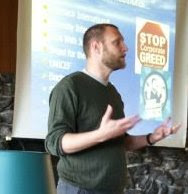Prodigals All
I assume we are to sympathize with the elder brother, the faithful son who stands bitterly unrewarded for his constant service while his younger brother is celebrated for having returned from gluttony and caprice. I certainly sympathize with him - and perhaps this shows just how far I have to come in my spiritual journey.
The preface is Jesus welcoming sinners who listen to him, and the Pharisees grumbling about it. The series of parables that follow, one of which is of the "prodigal son," illustrate the inverted relationship God has with humanity. God celebrates those we find it difficult or unfair to welcome. God revels in the recovery of one sinner more than the faithful piety of a hundred people. A dishonest manager who forgives debts out of scheming is praised for his good judgment - being faithful with dishonest wealth (which I will have to think about seriously sometime - 16:1-13 isn't on the lectionary schedule for this year).
I would like to think that I am above worldly ambitions, beyond American piety-prosperity and just rewards principles, not captive to notions of position in return for faithfulness and righteousness. But Jesus' parables call me out. My sympathies do not immediately follow Jesus'. I can understand Jesus' point, of course (all are equal in God's eyes, and therefore the recovery of one lost is cause for celebration, while the faithful continuance of another is just par for the course). But if I am honest with myself, I have to admit that I feel for the others - I am easily part of the crowd that is amazed and confused by Jesus' profound reassessment of the Reign of God and my particular place in it. I do feel like we faithful ones should be rewarded, and better! Those who come late, who haven't struggled and who may have even fought the faithful, don't deserve as much praise or celebration or reward as those who have fought the good fight, run the good race, longer, harder, with more sacrifice. Put shortly, I sympathize with the elder son.
A good deal of my identity - for better and for worse - is bound up in struggle: the struggle for this, the struggle against that - all very worthwhile and Christian principles. And I find myself bitterly struggling against other Christians oftentimes... even my own father. Now, my father, for instance, in his support for President Bush, is partly responsible for the horrific deaths of millions of people. I have been struggling with him for years now. If, at the very end, he responds to the gospel and decides he was wrong all those years - that won't bring those dead people back, it won't un-torture all those prisoners, it won't erase all the harm and violence he supported and contributed to. Meanwhile, not only have I been struggling against these things happening, my own father has struggled against me so that those things happen. And Jesus is saying that if my dad comes around at the last minute, God will throw a huge party. But my struggle remains uncelebrated.
That isn't fair.
At least, not according to the way the world thinks of fairness.
But, I suppose God isn't so interested in "fairness" as much as God is interested in love. Sure, economic and social justice are in part about fairness, but only as a public expression of our love for people - there isn't anything ultimate or absolute about how much wealth or food or comfort someone has, except that no one goes without or has needs unmet while others feast.
I have to give up my superiority complex, my holier-than-thou-because-I-struggle notion. If I'm struggling in order to feel superior or holier than someone else, then I'm doing it for the wrong reasons. Any struggle I engage in, any sacrifice I make, any cause I support, any side I take, must be done - if I am to be more like Jesus - in love, out of love, for love. I am to love such that I would celebrate any conversion, no matter how late, and not seek to be celebrated myself.
And, too, perhaps Jesus meant the listeners to identify with the younger son, who spent how many years squandering precious life and resources, and came back humble, desperate, ashamed, willing to be the least of the servants in his father's house - and finding his return celebrated. All of us, at some point, were the younger son returning, having wasted so much, been blind so long, only seeing the truth too late. Perhaps we get one party - when we turn - and then we get to work.
I guess no one ever said discipleship was easy or fair. It is what it is. And I should be content with mere discipleship, mere love.
Labels: Luke, Way of the Cross (Discipleship)



0 Comments:
Post a Comment
<< Home